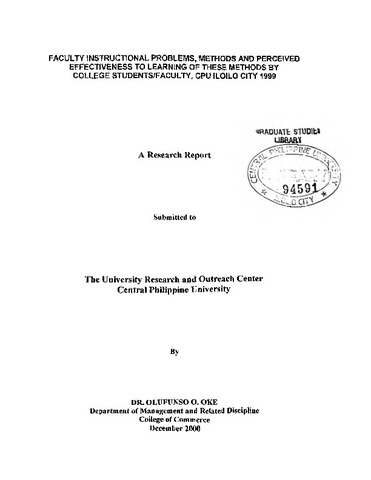Faculty instructional problems, methods and perceived effectiveness to learning of these methods by college students/faculty, CPU Iloilo City 1999
| dc.contributor.author | Oke, Olufunso O. | |
| dc.date.accessioned | 2021-05-31T05:37:12Z | |
| dc.date.available | 2021-05-31T05:37:12Z | |
| dc.date.issued | 2000-12 | |
| dc.identifier.citation | Oke, O. O. (2000). Faculty instructional problems, methods and perceived effectiveness to learning of these methods by college students/faculty, CPU Iloilo City 1999 (Research report). Jaro, Iloilo City: University Research Center, Central Philippine University. | en_US |
| dc.identifier.uri | https://hdl.handle.net/20.500.12852/928 | |
| dc.description | Abstract only | en_US |
| dc.description.abstract | This study identified the instructional methods and problems of CPU faculty, and measured the perceived effectiveness of these methods to learning by students and the faculty. The primary purpose of this study was to establish a baseline data on the above variables. The respondents of this study were forty-seven faculty and 324 students selected through purposive sampling from the Colleges of Arts and Sciences, Agriculture, Commerce, Education and Engineering. The questionnaire/checklist used to gather the data included two sections: Section one covered type method, and perceived effectiveness of these methods. Section two was a four- point scale on faculty instructional problems. Mean score and percentages were used as the bases for analysis and interpretation of the data. The findings of this study revealed that majority of CPU faculty used traditional school method or subject matter-centered method. The faculty of the Colleges of Arts and Sciences, Agriculture and Commerce used traditional school methods, which are subject matter-centered. The mentors of the Colleges of Engineering and Education utilize both traditional school method and progressive school method (student-centered). Student’s values and attitudes and lack of instructional materials were critical problems of the faculty that could affect effective teaching. The greatest percentage of CPU college students perceived expository and appreciation lesson to be highly effective among the traditional methods and discussion and discovery approach among the progressive method. Among the methods, the top four most commonly used methods were discussion, expository, lecture and deductive method. The same methods were perceived both by most of the students and the faculty members to be effective. Aside from discussion method, which is a progressive method, all of these were traditional school methods. | en_US |
| dc.format.extent | vi, 56 leaves | en_US |
| dc.language.iso | en | en_US |
| dc.publisher | Central Philippine University | en_US |
| dc.rights | Attribution-NonCommercial-NoDerivs 3.0 Philippines | * |
| dc.rights.uri | http://creativecommons.org/licenses/by-nc-nd/3.0/ph/ | * |
| dc.subject.ddc | GSL 378.242 Ok2 | en_US |
| dc.subject.lcsh | Central Philippine University | en_US |
| dc.subject.lcsh | Central Philippine University--Faculty | en_US |
| dc.subject.lcsh | Central Philippine University--Students | en_US |
| dc.subject.lcsh | Education, Higher | en_US |
| dc.subject.lcsh | Teaching | en_US |
| dc.subject.lcsh | Learning | en_US |
| dc.subject.lcsh | Educational evaluation | en_US |
| dc.subject.lcsh | Teaching--Methodology | en_US |
| dc.subject.lcsh | Study and teaching | en_US |
| dc.title | Faculty instructional problems, methods and perceived effectiveness to learning of these methods by college students/faculty, CPU Iloilo City 1999 | en_US |
| dc.title.alternative | Faculty instructional problems, methods and perceived effectiveness to learning of these methods by college students and faculty, Central Philippine University, Iloilo City 1999 | en_US |
| dc.type | Technical Report | en_US |
| dcterms.accessRights | Limited public access | en_US |
| dc.description.bibliographicalreferences | Includes bibliographical references | en_US |
Files in this item
This item appears in the following Collection(s)
-
Research reports [167]
-
Research reports [17]



